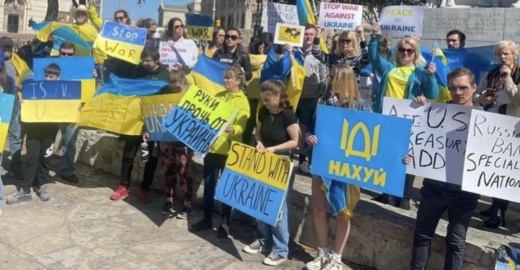A former U.S. ambassador to Ukraine recently used Zoom to join a native Ukrainian now living in San Antonio and a Trinity University political science professor in a public discussion about Russia’s invasion of Ukraine.
They agreed while the United States cannot directly engage Russia in Ukraine, there are ways for Ukraine’s allies to offer support.
Raindrop Turkish House, near Castle Hills, hosted a March 16 panel discussion facilitated by the World Affairs Council of San Antonio.
The discussion featured in-person appearances by Liliya Colston of the Ukrainian Society of San Antonio, and Professor Rosa Aloisi. Roman Popadiuk, the first U.S. ambassador to Ukraine, appeared via Zoom.
The three panelists touched on various aspects of Russia’s invasion of Ukraine, now entering its fourth week.
Popadiuk said Ukrainian leaders reluctantly understand that they alone must battle Russian aggression.
“They know it’s a war that they have to wage themselves,” said Popadiuk, who is of Ukrainian descent. “They are willing to do that, and they’ve proven that they can do that. What they need is the equipment to be able to wage that war.”
Ukrainian President Volodymyr Zelenskyy and supporters of Ukraine have pleaded for more aid from the United States and its allies. President Joe Biden said the United States would soon send $800 million in antiaircraft and antiarmor missiles and other supplies for Ukraine’s defenses.
“But we do not want to be in a situation where we have a direct exchange between the United States and Russia, or between NATO and Russia,” Popadiuk said.
Popadiuk said it is critical to establish safe corridors for humanitarian aid to flow into Ukraine and into bordering countries to help an estimated 3 million-plus refugees.
“There are a variety of options that we can examine here without necessarily getting stuck in the idea of direct conflict between the United States and Russia,” Popadiuk said.
Aloisi said the international community has been mostly cautious in its overall response to Russia’s invasion, adding that diplomats worldwide have employed a range of tools short of full intervention.
“It seems we want to avoid that type of confrontation for obvious reasons,” Aloisi said.
Colston said Ukrainians have proven that they are stronger and more resilient than what many people worldwide expected given Russia’s military strength.
According to Colston, Ukraine wants all the help it can get to keep waging war for as long as possible.
“They can do that but with extra help from the old world. That is absolutely true,” she said.
Popadiuk said opinions vary on what exactly spurred Russian President Vladimir Putin to move against Ukraine. But the panelists dismissed popular suggestions, especially those present in pro-Russian propaganda, that a threat of NATO or European Union expansion through Ukraine posed a risk to Russia.
The panelists also rejected suggestions that Putin is mentally unstable or that Russia wants to purge Ukraine, a former Soviet republic, of purported neo-Nazi elements, specifically in the disputed territories dominated by Russian-backed separatists.
Instead, Popadiuk said, Putin believes Ukraine is “not a real country, has never been a country, that it’s composed of several geographic areas and that the Ukrainians and Russians are one people.”
Popadiuk said Russians and Ukrainians have some ancestral ties, but that Russia has long used that connection as a pretext to maintain some semblance of power in Ukraine.
Popadiuk also proposed that Russia is likely motivated by the belief that Ukraine is becoming a more independent democracy with strengthening Western ties.
“I think this issue of NATO [being the cause] is an artificial issue with Putin, or even the EU,” Popadiuk said. “This is something that [Putin] cannot fathom because the traditional authoritarian structure that Russia has lived under for centuries, this kind of example could ignite a greater sense of reform or a movement toward reform within Russia itself.”
Aloisi said Putin is a former KGB officer who possesses a mistrust of the West, adding that Putin likely is using the invasion as a show of force to demonstrate his control and leadership.
Colston said Putin has only reinforced his image as one of an authoritarian presiding over a supposed fledgling Russian democracy.
“They say it’s a democracy, but how can that be if he’s the only one with so much power and for too long?” Colston said.
The panelists said if Russia somehow prevails in Ukraine, it could embolden Putin to act against other neighboring countries.
In the meantime, things such as sanctions against Russia must be allowed time to be effective to pressure Putin’s regime out of Ukraine, the panelists said.
“I think sanctions will definitely help. They are working already. It just takes time,” Colston said.
The panelists also urged the community to do what it can to help Ukrainian refugees and those who remain inside the besieged country.
Answering an audience member’s question, Aloisi said the war in Ukraine enables human traffickers to take advantage of Ukrainians desperate to flee violence in their nation.
“[Trafficking is] ongoing. It’s something that is going to be very difficult to stop entirely from happening. Hopefully the war will stop, and they can go back to relative normalcy,” she said.
Colston urged the public to donate money to www.givsendgo.com/ussa to enable purchases of medical supplies and to support humanitarian aid.
She said monetary donations are more effective than individuals directly donating their own items that might not be the correct necessities for recipients in Ukraine.
Colston also said her organization is communicating with people in Ukraine to secure locations to collect and disburse needed humanitarian supplies.
“People who cannot move—those supplies will be delivered to them. We’ve actually established strong and nice connections not just from the point of dropping off supplies, but also having someone in Ukraine picking it up and distributing it,” she said.





